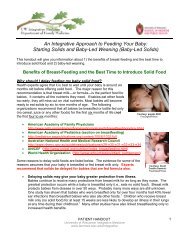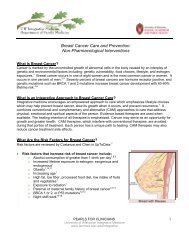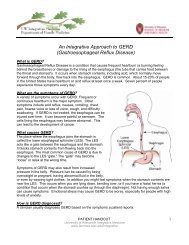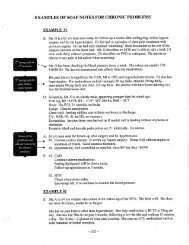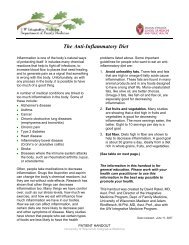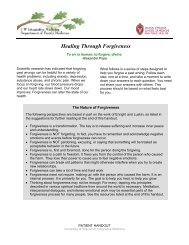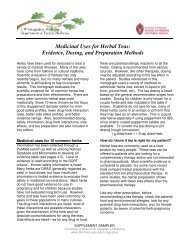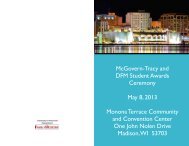Mental Notes Magazine - UW Family Medicine - University of ...
Mental Notes Magazine - UW Family Medicine - University of ...
Mental Notes Magazine - UW Family Medicine - University of ...
You also want an ePaper? Increase the reach of your titles
YUMPU automatically turns print PDFs into web optimized ePapers that Google loves.
the brain-gut pathways and improve the clinical<br />
manifestations <strong>of</strong> pain and bowel dysfunction.<br />
Improvements in coping, global distress, and<br />
overall quality <strong>of</strong> life has been shown. The<br />
most commonly used psychotropic agents for<br />
the IBS are low doses <strong>of</strong> antidepressants such<br />
as Amitriptyline or Desipramine. Notably, the<br />
analgesic effect appears independent <strong>of</strong> the<br />
actions on mood disturbance, and it occurs<br />
before the improvement in psychological<br />
symptoms, indicating a separate mechanism <strong>of</strong><br />
action over treatment <strong>of</strong> mood disturbance<br />
with these agents.<br />
Behavioral treatments have advantages<br />
because <strong>of</strong> their safety, and ability to target<br />
factors contributing towards symptom<br />
perpetuation. These include modifying<br />
maladaptive illness beliefs (e.g., patients<br />
reporting: ‘I can never get better’, ‘My symptoms<br />
will lead to cancer’, etc.), behaviors (such as<br />
fear based avoidance and withdrawal from<br />
activities), symptom specific anxiety (specific<br />
fears about symptoms and activities associated<br />
with symptoms), and feelings <strong>of</strong> helplessness<br />
and lack <strong>of</strong> control. No one treatment is<br />
superior and the decision for a particular<br />
treatment is based upon the availability and skill<br />
<strong>of</strong> the therapist and the interests <strong>of</strong> the patient.<br />
A referral to a behavioral therapist is advised.<br />
These behavioral treatments can be synergistic<br />
to medical treatments.<br />
References<br />
1. Longstreth GF, Thompson WG, Chey<br />
Fear, anger, anxiety, painful stimuli, and physical stress are all WD, Houghton LA, Mearin F, Spiller RC.<br />
associated with abnormalities in the motility <strong>of</strong> GI tract Functional bowel disorders.<br />
Gastroenterology 2006;130:1480-91.<br />
establishing a therapeutic doctor-patient relationship is 2. Tanaka Y, Kanazawa M, Fukudo S, Drossman DA.<br />
the stepping stone to provide an effective treatment to<br />
patients with IBS. This is done when the physician: 1)<br />
Biopsychosocial model <strong>of</strong> irritable bowel syndrome. J.<br />
Neurogastroenterol. Motil. 2011;17:131-9.<br />
elicits and validates the patient’s beliefs, concerns and 3. Drossman DA, Talley NJ, Leserman J, Olden<br />
expectations, 2) <strong>of</strong>fers empathy when needed, 3) clarifies<br />
patient misunderstandings, 4) provides education, and<br />
5) negotiates with the patient the plan <strong>of</strong> treatment. At<br />
KW, Barreiro MA. Sexual and physical abuse and<br />
gastrointestinal illness. Review and recommendations.<br />
Annals <strong>of</strong> Internal <strong>Medicine</strong> 1995;123:782-94.<br />
the same time boundaries should be set up and goals 4. Levy RL, Olden KW, Nalib<strong>of</strong>f BD, Bradley LA,<br />
<strong>of</strong> treatment should be realistic and focus on “adapting”<br />
rather than complete “cure”.<br />
In addition to usual treatments that symptomatically<br />
Francisconi C, Drossman DA, Creed F. Psychosocial<br />
aspects <strong>of</strong> the functional gastrointestinal disorders.<br />
Gastroenterology 2006;130:1447-58.<br />
treat diarrhea, constipation, or pain, psychological and 5. Grover M, Drossman DA. Psychopharmacologic<br />
behavioral treatments are also effective in the treatment<br />
<strong>of</strong> IBS particularly for patients with more moderate or<br />
severe symptoms 5 . These influence the dysregulation <strong>of</strong><br />
and behavioral treatments for functional gastrointestinal<br />
disorders. Gastrointestinal Endoscopy Clinics <strong>of</strong> North<br />
America 2009;19:151-70, vii-viii.<br />
Summer 2012 / <strong>Mental</strong> <strong>Notes</strong> / 13



